A Look at ‘ Jones in the Fast Lane ’
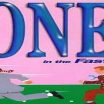
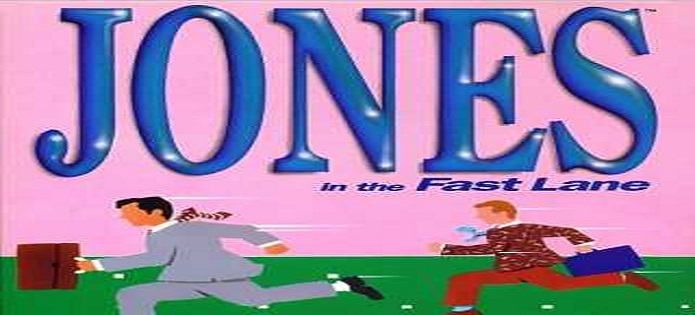 As my previous article discussed, Sierra On-Line was, during the mid 80’s through mid-90’s, best known for its lines of graphical adventure games. While adventure titles were certainly their bread and butter, they nonetheless published and developed a variety of games in other genres. Its obvious to even a passing fan of Sierra’s past output that there were a lot of creative people working for and with the company – they showed a willingness to take risks and do some unexpected things. One of the more bizarre games they managed to come up with was 1990’s Jones in the Fast Lane for the PC.
As my previous article discussed, Sierra On-Line was, during the mid 80’s through mid-90’s, best known for its lines of graphical adventure games. While adventure titles were certainly their bread and butter, they nonetheless published and developed a variety of games in other genres. Its obvious to even a passing fan of Sierra’s past output that there were a lot of creative people working for and with the company – they showed a willingness to take risks and do some unexpected things. One of the more bizarre games they managed to come up with was 1990’s Jones in the Fast Lane for the PC.
The little known Jones in the Fast Lane (JITFL) could arguably be used as a fair barometer of one’s Sierra fandom: plenty of King’s Quest and Space Quest aficionado aren’t even aware that it existed. Even describing it to the uninitiated is somewhat difficult – I’ve heard it classified as a mixture between a life simulation game and a board game. One can certainly see the influences of Monopoly, Careers and Milton Bradley’s Game of Life in the design. The board game interface belies the fact that while JITFL involves elements of chance, there is actually a great deal of player control and choice involved in achieving success.
‘Success’ is the operative word in JITFL, and whether playing alone against the computer-controlled “Jones” or against up to 3 other human players, the aim is to ‘get ahead’ in the areas of money, happiness, status and education. The first to achieve the desired maximum ratings across those scales is the victor. Juggling these areas is challenging, to say the least, in the early going. The game proceeds in turns, which each representing a single week in each player’s life. Clicking on locations on the board moves a coloured marker around, though all players get to pick out one of several (256 colour graphic) visual representations of themselves from a list of male or female templates. “Jones” himself is an awkward looking, bespectacled go-getter and a life-sized cartoon animated opponent.
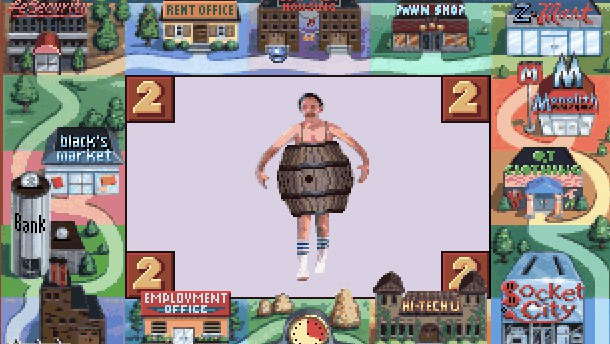
The controls and movement are fairly simple. A clock icon represents your time allowance for the your turn or “week”. All passage around the board takes time, as does activity such as working at your job, taking classes, resting, etc. Purchases and transactions can be done at one’s own pace, and time only passes when the player acts. At the end of the week the player is whisked back to their home base, which starts out as a dilapidated apartment. In between turns “What a Weekend” random events occur, which in addition to providing the odd laugh, typically cost the player money on some sort of fun or entertainment.
The fourteen locations on the board, not including two residential spots, represent potential places of employment, stores, centres for career advancement and education or sometimes a combination of options. For example one can both work at the grocery store and buy food there for the week. Rent is due once per month, though when you’re in dire circumstances it is possible to ask for an extension. Finding a balance is crucial – one can get by for a while working long hours and subsisting on fast-food from Monolith Burger, but your happiness, status and education levels will stagnate if you neglect entertainment, consumer goods and getting advanced job qualifications. Sometimes getting ahead requires working less while you hit the books, but work too little and your poor work history will nix your chances at a promotion.
Random events such as getting mugged on the street by local criminal ‘Wild Willy’ or having the contents of your scummy apartment stolen can be a real set-back. Upgrading to the more secure condo rental once you can afford one is a must in a longer session. You can always hit the pawn-shop if you need some quick cash. Certain items such as books or a computer can help to make your education go quicker and more efficiently. A refrigerator helps keep food from spoiling and wasting your money. Upgrading your wardrobe is often a direct requirement for a promotion – the stiff at the employment office will often hint as much if you’re not dressed adequately. Go long enough without buying new duds and you’ll be treated to an image of your character strolling around town in a barrel.
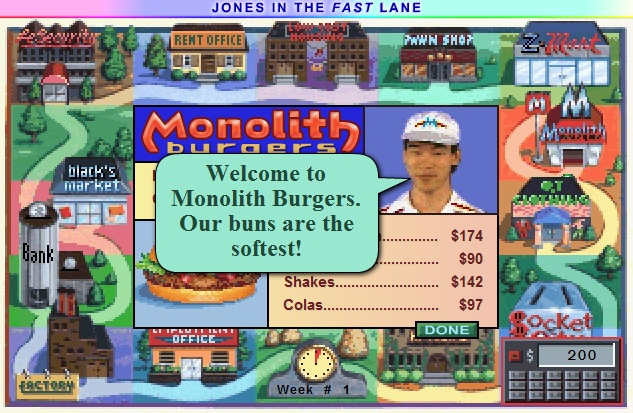 The humour in JIFTL is vintage Sierra – each place you visit on the map is staffed buy a fully voiced talking-head, and they all have a long list of jokes, insults and one-liners to spout when you walk in the door. The music is fun and vibrant, though admittedly repetitive by the time your thirtieth turn comes around. I’m not familiar with any of the creative talents behind the game though from what I’ve read they all seem to be veterans of other Sierra releases. Indeed some of the faces and voices in the game belong to various Sierra employees. References to other Sierra games abound as well, from the electronics retailer “Socket City” to the aforementioned fast-food juggernaut, “Monolith Burger” of Space Quest III fame.
The humour in JIFTL is vintage Sierra – each place you visit on the map is staffed buy a fully voiced talking-head, and they all have a long list of jokes, insults and one-liners to spout when you walk in the door. The music is fun and vibrant, though admittedly repetitive by the time your thirtieth turn comes around. I’m not familiar with any of the creative talents behind the game though from what I’ve read they all seem to be veterans of other Sierra releases. Indeed some of the faces and voices in the game belong to various Sierra employees. References to other Sierra games abound as well, from the electronics retailer “Socket City” to the aforementioned fast-food juggernaut, “Monolith Burger” of Space Quest III fame.
Winning at JITFL involves managing both long term goals and your activity each turn. The game’s economy varies over time, so it can reward you to be patient and wait for bargains. Investment options at the bank can help you get ahead if you’re willing to pay close attention. Making certain you plan your routes each week around the board will ensure less wasted time that could be spent working, studying or relaxing. Eating the same junk each week can be easy on the wallet but can cost you in other ways. For a simple game, the strategies are varied – which top level jobs are the easier to advance to the quickest? How much spare cash is necessary to ride the week to week fluctuations? It can take a few play-throughs to really come to grips with all the variables.
How can one play Jones in the Fast Lane today? I know next to nothing about MS-DOS or Windows emulators but I gather they must be an option. An unofficial flash remake was released in the mid 2000s and has mixed reviews. Several remakes appear to be available and I’ve even seen what appears to be an iOS port. Perhaps we can hold out hope that Sierra Entertainment will see to releasing the game on Steam or GoG – until then JITFL will remain a curiosity from another age, but one well worth a look if you can find a way to play it.



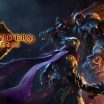




Leave a Reply